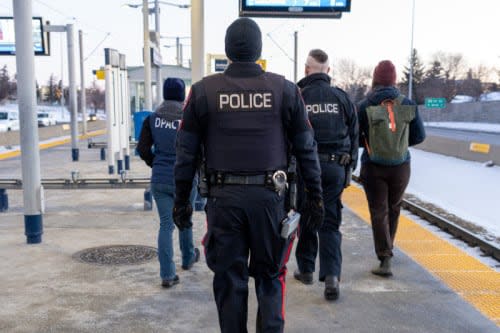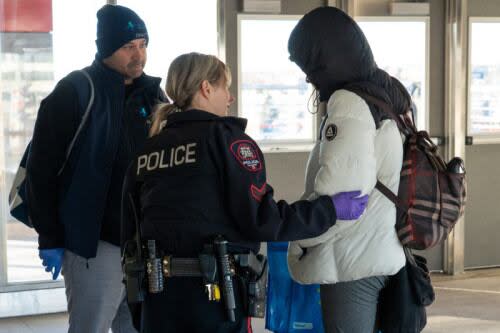Undercover CTrain operation shows progression of relationship between police, service agencies

Wednesday morning, the Calgary Police Service announced the results of a two-week drug trafficking operation focused on the city's CTrain stations with the highest levels of crime and disorder.
Police said 27 people are now facing 212 criminal charges, and multiple weapons were seized.
But unlike most police news releases announcing arrests, this one didn't end with the number of charges laid and photographs of the weapons or drugs seized. There was more.
"Recognizing some of the vulnerable persons using the CTrain stations suffer from addiction," the police statement said, "the second phase of the operation involved providing outreach to this community."
"Our community outreach team consists of transit peace officers and outreach workers from the Alpha House. Once the policing operations focused on illegal drugs was complete, this team co-ordinated with the CPS to help people who are struggling with addictions and to assist them in connecting with available resources."
Calgary police Chief Mark Neufeld says this multi-pronged approach marks a progression in the way CPS intends to handle the issue of transit safety, a concern that is top-of-mind for Calgarians.
"I think the progress that's been made, quite frankly, is a better understanding of who's there and what the issues are, and the need to actually bring other services in there," Neufeld told CBC News in an end-of-year interview this week.
Policing only part of solution
He says regular policing will continue, and the stats show that CPS officers have been very busy on the CTrain and bus system over the past year.
"We've seen, I think, somewhere in the area of about 3,300 criminal charges laid in and around transit. We've seen about 3,600 tickets issued, as well as about 5,400 warrants executed on individuals in and around transit," Neufeld said.
But there's an acknowledgement now that policing is only one part of the solution.
"There are people who are criminals, frankly, who need a criminal justice intervention ... There are people who are struggling with all kinds of things. Perhaps it's employment, perhaps it's housing, perhaps it's addictions, perhaps it's mental health, perhaps it's a combination of those things. But what we've learned is a single response will not work for everybody," he said.
"In the past, I think the approach of the police, or transit peace officers and police, was to go in and say, 'Move on.' I think what we've seen is, if people move on, they'll move on somewhere else within the system, or they'll move into the community, and at the end of the day, nothing's been solved there."

Shaundra Bruvall of Alpha House Society says she’s noticed a real 'culture shift' in the way her group is asked to collaborate with partners in responding to social issues, like homelessness and public substance use. (Calgary Police Service)
Shaundra Bruvall is a program director at Alpha House Society, a non-profit agency that provides safe environments for individuals affected by alcohol and other substance dependencies. Her group was mentioned by CPS as part of the outreach team involved in the CTrain operation.
She says she's noticed a real "culture shift" in the way her group is asked to collaborate with partners, including Calgary police, transit and bylaw services, in responding to social issues like homelessness and public substance use.
"Kudos to the police for really recognizing when police intervention is not necessary, and diverting a call to a team that can respond in a more appropriate manner," Bruvall said.
As an illustration of what she means, Bruvall uses the example of an individual sleeping on the street or experiencing homelessness, perhaps intoxicated or under the influence of substances.
"What they ultimately need is a friendly face, transport to a shelter or a housing program. They need some snacks, or to warm up in a van for a little bit," she said.
"That type of intervention is not something police should be involved in. There's no crime occurring. There's no issue with that individual. What that individual needs is connection with social service agencies to get the support they need for the current issues they have."
Bruvall says the growth in the relationship between service agencies and police means both a more efficient use of resources, and better outcomes for individuals. And, she says, the police understand that.
Most appropriate response
"Police are just doing a phenomenal job of recognizing when they are not the best response and ensuring that another group is there to provide the most appropriate response," she said.
The recent operation that triggered this week's news release involved undercover officers, community engagement officers and transit safety officers. A total of 40 undercover drug purchases were made, leading to the charges and confiscation of the weapons, which included an axe, 15 knives, bear spray, batons and Airsoft pistols, which fire plastic pellets.
"With the help of various teams and units within the CPS, and transit public safety, we were able to successfully apprehend these individuals and hold them accountable for not only their crimes, but for putting our communities at risk," the police statement said.
Neufeld says the focus on safe infrastructure extends beyond public transit to all public spaces in the city.
"Fundamentally, that infrastructure has to be safe for people to be able to use it in the way it was intended for us to have success as a city. There's a big role for police in making sure that that remains safe," he said.
But that role is not for the police to play exclusively.
"The police are part of it, for sure. The police are necessary to make sure that our social service partners can work safely in that space as well. But I think it's about understanding who is there, why they're there, and what it's going to take to get them out of that system. And I think that's the progress that's been made," Neufeld said.
